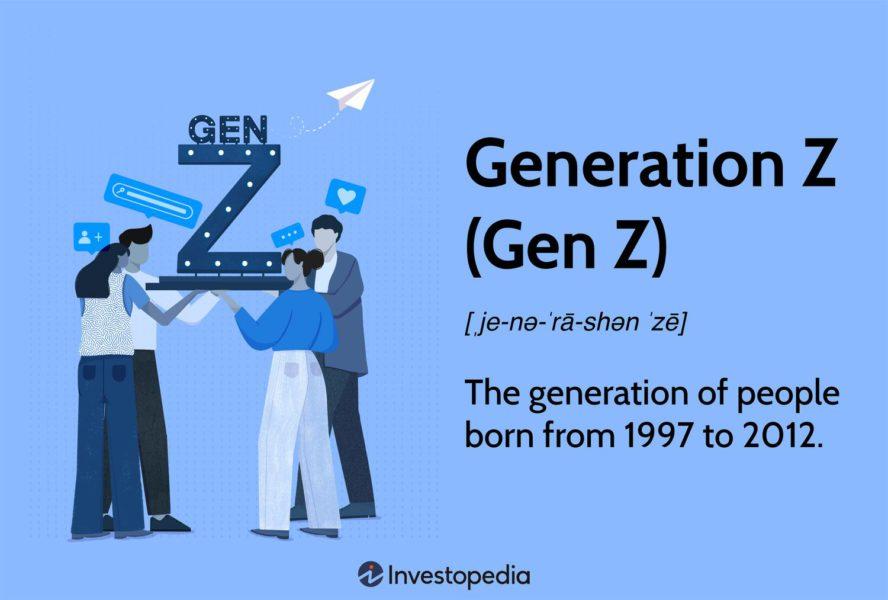What Is Gen Z Approach To DeFi And How Will They Achieve Financial Independence
Generation Z, often referred to as Gen Z, comprises individuals born between the mid-1990s and the early 2010s. As digital natives, they have grown up in a world of smartphones, social media, and internet access, shaping their perspectives and behaviors in ways distinct from previous generations. One area where this distinction is particularly evident is in their approach to finance, notably in their embrace of Decentralized Finance (DeFi). This article explores how Gen Z is redefining the financial landscape through DeFi and the implications of this digital-native generation on the future of finance.
How Gen Z is redefining the financial landscape through DeFi?
1. Digital Natives and Financial Innovation:
Gen Z has been immersed in technology since birth, and they exhibit a natural aptitude for navigating the digital world. This comfort with technology extends to their approach to finance. Gen Z individuals are early adopters of financial technology (fintech) and innovative financial solutions such as DeFi. They are unafraid to experiment with digital platforms and embrace new, decentralized financial systems.
2. Embracing DeFi:
DeFi is a novel financial ecosystem that leverages blockchain technology to create decentralized, trustless financial services. Gen Z’s adoption of DeFi is driven by their trust in blockchain technology, which provides transparency and security. They recognize that DeFi offers opportunities for financial inclusion, allowing access to a wide range of financial services without the need for traditional intermediaries like banks.
3. Control and Ownership:
Gen Z values autonomy and ownership, and DeFi aligns with these principles. In DeFi, users have control over their assets, private keys, and financial decisions. This appeals to Gen Z’s desire for financial self-determination and the ability to manage their assets without relying on centralized institutions.
4. Decentralized Lending and Borrowing:
DeFi platforms offer decentralized lending and borrowing services, allowing users to earn interest on their crypto assets or secure loans without traditional credit checks. Gen Z recognizes the benefits of these services, particularly as they may have limited access to traditional banking or face barriers to credit.
5. Yield Farming and Liquidity Provision:
Gen Z is actively participating in DeFi’s yield farming and liquidity provision programs. These programs enable users to earn rewards by providing liquidity to decentralized exchanges and lending platforms. For a generation looking to make the most of their digital assets, this is an attractive way to generate passive income.
6. NFTs and Digital Collectibles:
Gen Z’s interest in the digital realm extends to the world of NFTs (Non-Fungible Tokens). They are active in NFT marketplaces, buying, selling, and trading digital collectibles, art, and virtual real estate. DeFi also intersects with NFTs, as users can collateralize NFT assets to access loans or liquidity.
7. Decentralized Identity and Privacy:
Gen Z values their digital identity and privacy. DeFi’s decentralized identity solutions and privacy features resonate with their desire for secure and private financial interactions.
8. Access to Global Markets:
DeFi transcends geographic boundaries, allowing Gen Z to access global financial markets. This global reach provides them with diverse investment opportunities and a means to diversify their portfolios.
9. Financial Education and Empowerment:
Gen Z is eager to learn and is actively seeking financial education. They are exploring DeFi platforms, participating in online communities, and engaging with educational content to understand the intricacies of blockchain and decentralized finance. They recognize the importance of financial literacy and are taking the initiative to educate themselves.
10. Challenges and Risks:
While Gen Z’s embrace of DeFi is exciting and promising, it comes with challenges and risks. DeFi platforms are still relatively new and evolving, which means they can be prone to vulnerabilities, scams, and regulatory scrutiny. Gen Z must navigate these complexities and exercise caution while participating in DeFi.
As this gen Z comes into the investing/defi/nft space, Market research shows they are prone to yolo invest and that is scury and exciting. Wonder if its because they are more prone to listen to “influencers” as they grew up in the social media space. hmm
— qrime.eth (@crispylines) June 24, 2021
The Role of DeFi in Gen Z’s Financial Independence

DeFi (Decentralized Finance) is not just a financial trend for Gen Z; it’s a critical tool for achieving financial independence. In this section, we explore how DeFi plays a pivotal role in empowering Gen Z to take control of their financial futures:
1. Autonomy and Ownership:
DeFi provides Gen Z with a level of autonomy and ownership that traditional financial systems cannot match. They have control over their digital assets, private keys, and financial decisions. This level of control empowers them to make financial choices independently, whether it’s investing, borrowing, or lending.
2. Financial Inclusion:
For Gen Z, financial inclusion is more than just a buzzword. DeFi offers them access to a wide range of financial services without the need for intermediaries like banks. This access is particularly crucial for those who may be underbanked or live in regions with limited financial infrastructure. DeFi brings the unbanked and underbanked into the global financial system.
3. Earning Passive Income:
DeFi platforms offer opportunities for Gen Z to earn passive income through activities like yield farming and liquidity provision. This passive income generation can be an important source of financial stability, especially for a generation looking for alternative ways to build wealth.
4. Decentralized Lending and Borrowing:
DeFi’s decentralized lending and borrowing services allow Gen Z to secure loans or earn interest on their crypto assets without traditional credit checks. This approach to lending and borrowing is more accessible and flexible than traditional financial institutions, making it an attractive option for this generation.
5. Global Investment Opportunities:
DeFi platforms grant Gen Z access to global financial markets, enabling them to diversify their investment portfolios beyond traditional asset classes. This global reach allows them to explore new investment opportunities and potentially achieve a more diversified and resilient financial future.
6. Decentralized Identity and Privacy:
Gen Z places a high value on their digital identity and privacy. DeFi’s decentralized identity solutions and privacy features align with their desire for secure and private financial interactions. They can engage in financial activities without compromising their personal data.
7. Financial Education and Empowerment:
Gen Z recognizes the importance of financial literacy and is actively seeking education. They engage with DeFi platforms, participate in online communities, and consume educational content to understand the intricacies of blockchain and decentralized finance. This proactive approach to financial education empowers them to navigate the complexities of the DeFi landscape.
8. Challenging the Status Quo:
Gen Z’s adoption of DeFi challenges traditional financial institutions and encourages them to innovate and adapt. The financial industry is recognizing that the digital-native generation is a driving force in shaping the future of finance. DeFi’s rise exemplifies the need for financial institutions to evolve in response to changing consumer expectations.
9. Risks and Responsibility:
While DeFi offers significant benefits, it is not without its risks. Gen Z must be aware of potential vulnerabilities, scams, and regulatory developments in the DeFi space. Financial independence through DeFi comes with the responsibility of safeguarding digital assets and making informed financial decisions.
10. The Future of Financial Independence:
DeFi is a catalyst for Gen Z’s financial independence. It empowers them to take charge of their financial futures, make informed decisions, and challenge traditional financial paradigms. As Gen Z continues to shape the landscape of DeFi, their impact on the broader financial industry will be felt for years to come.
In conclusion, DeFi is not just a financial trend but a key enabler of Gen Z’s financial independence. It provides them with the tools and opportunities to build wealth, access global financial markets, and take control of their financial destinies. As they continue to embrace and innovate within the DeFi space, they are poised to revolutionize how we think about finance in the digital age. Gen Z is not merely the future of finance; they are the architects of a financial landscape where autonomy, inclusion, and innovation are paramount.
The Future of Finance: Gen Z as Financial Innovators
As Gen Z continues to shape the future of finance through their embrace of DeFi, they are influencing the broader financial landscape. Their preference for digital autonomy, ownership, and access to a global financial ecosystem is driving innovation in the fintech and DeFi sectors.
However, it’s important to note that while Gen Z’s approach to finance is bold and forward-thinking, it is not without its challenges. They must be vigilant in protecting their digital assets, be aware of regulatory developments, and stay informed about the rapidly evolving DeFi space.
In conclusion, Gen Z’s approach to DeFi reflects their digital-native identity and innovative spirit. Their early adoption of decentralized financial systems is transforming the financial industry, and their values of autonomy and financial empowerment are reshaping the way we think about money and assets in the digital age. As Gen Z continues to influence the financial world, their impact on the adoption and development of DeFi will undoubtedly be a driving force in the evolution of the financial industry.
FAQs about GenZ involvement in DeFi
1. What will define Gen Z? Gen Z, the generation born roughly between the mid-1990s and the early 2010s, is characterized by several defining traits. These include being digitally native, highly tech-savvy, diverse, socially conscious, and pragmatic. Gen Z is expected to shape the future with their unique approach to technology, social issues, and financial matters.
2. What is Gen Z actually called? Gen Z is the commonly used term to refer to this generation. They are sometimes referred to as “Zoomers” as a playful play on the “Z” in their generational label.
3. Is DeFi and crypto the same? No, DeFi (Decentralized Finance) and cryptocurrency are not the same, but they are closely related. Cryptocurrency refers to digital or virtual currencies that use cryptography for security. DeFi, on the other hand, is a subset of the cryptocurrency space that focuses on creating decentralized financial applications and services, such as lending, borrowing, and trading, using blockchain technology. DeFi utilizes cryptocurrencies but extends beyond them to include various financial tools and services.
4. Which cryptocurrency is DeFi? DeFi is not a specific cryptocurrency; rather, it’s a concept that encompasses various cryptocurrencies and blockchain platforms. Ethereum (ETH) is a commonly used blockchain for DeFi applications, as it supports the creation of smart contracts. Numerous DeFi projects and tokens, such as Aave (AAVE), Compound (COMP), and Maker (MKR), are built on the Ethereum network. However, DeFi is not limited to Ethereum, and other blockchains like Binance Smart Chain, Solana, and Polkadot also host DeFi projects.
5. Is DeFi only for cryptocurrency? DeFi primarily operates in the cryptocurrency space, but its applications extend beyond cryptocurrency. While cryptocurrencies play a central role in many DeFi platforms, the underlying technology, blockchain, and smart contracts are used to create decentralized financial services. These services can include lending, borrowing, yield farming, insurance, and more. DeFi is designed to decentralize and democratize traditional financial services and make them accessible to a global audience, often using cryptocurrencies as a means of exchange and collateral.
Stay informed with daily updates from Blockchain Magazine on Google News. Click here to follow us and mark as favorite: [Blockchain Magazine on Google News].
Get Blockchain Insights In Inbox
Stay ahead of the curve with expert analysis and market updates.
latest from tech
Disclaimer: Any post shared by a third-party agency are sponsored and Blockchain Magazine has no views on any such posts. The views and opinions expressed in this post are those of the clients and do not necessarily reflect the official policy or position of Blockchain Magazine. The information provided in this post is for informational purposes only and should not be considered as financial, investment, or professional advice. Blockchain Magazine does not endorse or promote any specific products, services, or companies mentioned in this posts. Readers are encouraged to conduct their own research and consult with a qualified professional before making any financial decisions.

 Bitcoin
Bitcoin  Ethereum
Ethereum  Tether
Tether  XRP
XRP  Solana
Solana  Dogecoin
Dogecoin  USDC
USDC  Lido Staked Ether
Lido Staked Ether  Cardano
Cardano  TRON
TRON  Avalanche
Avalanche  Chainlink
Chainlink  Wrapped stETH
Wrapped stETH  Toncoin
Toncoin  Sui
Sui  Shiba Inu
Shiba Inu  Wrapped Bitcoin
Wrapped Bitcoin  Stellar
Stellar  Polkadot
Polkadot  Hyperliquid
Hyperliquid  Hedera
Hedera  WETH
WETH  Bitcoin Cash
Bitcoin Cash  LEO Token
LEO Token  Uniswap
Uniswap  Litecoin
Litecoin  Pepe
Pepe  Wrapped eETH
Wrapped eETH  NEAR Protocol
NEAR Protocol  Ethena USDe
Ethena USDe  Aptos
Aptos  USDS
USDS  Internet Computer
Internet Computer  Aave
Aave  Cronos
Cronos  POL (ex-MATIC)
POL (ex-MATIC)  Mantle
Mantle  Ethereum Classic
Ethereum Classic  Render
Render  MANTRA
MANTRA  Monero
Monero  WhiteBIT Coin
WhiteBIT Coin  Bittensor
Bittensor  Artificial Superintelligence Alliance
Artificial Superintelligence Alliance  Dai
Dai  Arbitrum
Arbitrum  Ethena
Ethena 





